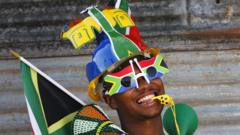The recent update features a colorful array of South African terminology that exemplifies the nation's rich linguistic heritage. South African expressions like “gatvol,” meaning fed up, and “tjoekie,” referring to jail, have gained recognition, alongside words from other countries such as the Philippines and Ireland.
Among the delighted South Africans, “Yoh” stands out as a common exclamation, tracing back to 1855, embodying surprise and admiration. “Gatvol,” introduced into English vernacular in 1980, articulates deep frustration or annoyance. Other notable terms include “seshweshwe,” named after a distinct cotton fabric; “makarapa,” a decorated hard hat adopted by sports fans; and “zols,” referring to marijuana.
Moreover, the phrase “sharp-sharp,” introduced around 1991, signifies a casual greeting or compliment, revealing South Africa's vibrant social culture. Highlighting these expressions is a celebration of the country’s identity, reflecting how language evolves and integrates into daily life.
The updates from the OED act as a bridge, connecting South Africa’s lexicon with global recognition, encouraging further exploration of its 12 official languages’ contributions. For more details, visit the OED's website to discover the words making waves globally.
Among the delighted South Africans, “Yoh” stands out as a common exclamation, tracing back to 1855, embodying surprise and admiration. “Gatvol,” introduced into English vernacular in 1980, articulates deep frustration or annoyance. Other notable terms include “seshweshwe,” named after a distinct cotton fabric; “makarapa,” a decorated hard hat adopted by sports fans; and “zols,” referring to marijuana.
Moreover, the phrase “sharp-sharp,” introduced around 1991, signifies a casual greeting or compliment, revealing South Africa's vibrant social culture. Highlighting these expressions is a celebration of the country’s identity, reflecting how language evolves and integrates into daily life.
The updates from the OED act as a bridge, connecting South Africa’s lexicon with global recognition, encouraging further exploration of its 12 official languages’ contributions. For more details, visit the OED's website to discover the words making waves globally.



















